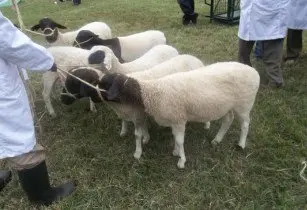A rise in demand for Dorper sheep as a source of meat across East Africa in recent years is putting pressure on breeders
From the flat plains of Kajiado, Laikipia and Naivasha in Kenya to the lowlands of Tanzania, the demand for Dorper breeding sheep has been rising over the last few years.
The Dorper sheep has increasingly become a breed of choice for many farmers in the country, mainly due to rising demand for its low-fat quality meat.
“Demand for breeding ewes has been rising far beyond the supply. Farmers from neighbouring countries such as Tanzania have been flocking the country looking for ewes,” observed Kone Ole-Sein, a Dorper farmer from Kajiado County and also the national secretary of the Dorper Breeders' Society of Kenya, an umbrella body that brings together corporate and individual farmers.
During this year’s Brookside Livestock Fair held at Jamhuri Park in Nairobi, the association received many queries as prospective farmers sought information on how to source breeding ewes.
“Dorper sheep do well on natural pastures although farmers may offer supplementary feeding during scarcity or based on nutritional requirements. They are hardy and will perform well in low ecological zones,” noted Ole-Sein, the proprietor of the 1,700-acre Rimpa Estates in Kiserian, where she has raised more than 220 breeding ewes and 68 rams.
According to Ole-Sein, a breeding ram currently costs between US$313 to US$500 with ewes selling from US$125 to US$188, underscoring the increased monetary value of the dorper to farmers across Kenya.
“We breed rams and then dispose them to farmers for breeding purposes. Demand for rams is quite high across the country,” observed livestock production officer Cleopas Wahome.
Mwangi Mumero




